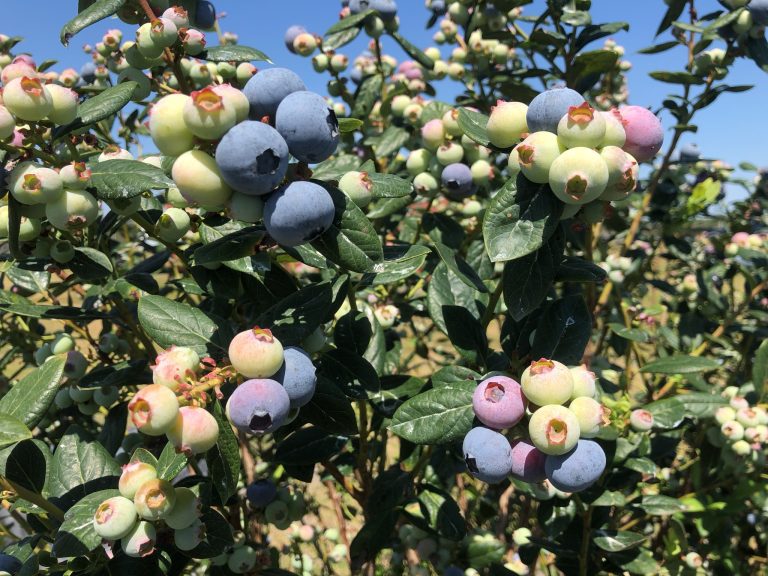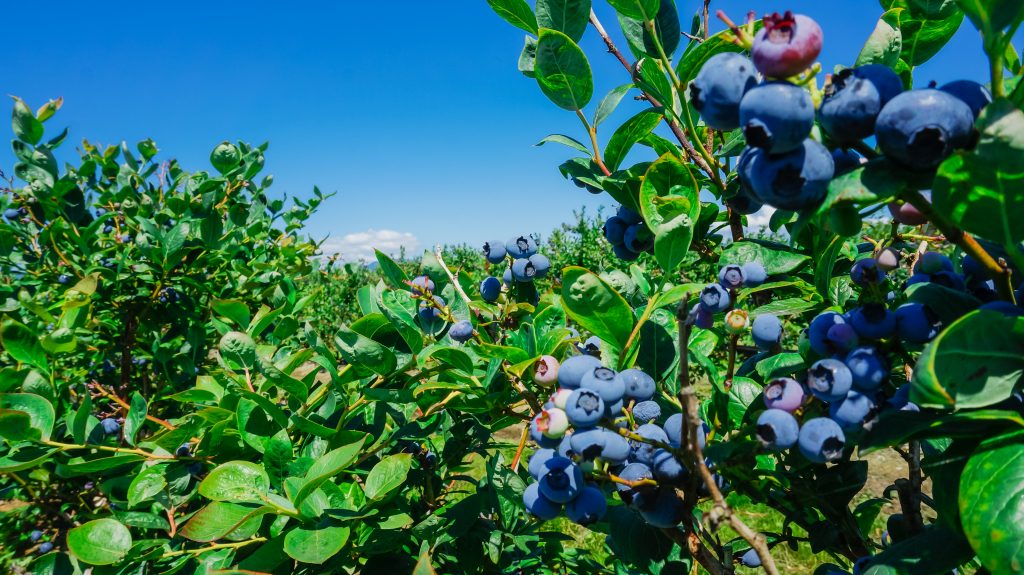By Clint Thompson Most of Georgia’s blueberry crop survived sub-freezing temperatures two weeks ago. Only the early Southern Highbush varieties received damage, says Renee Holland, University of Georgia area Extension agent for commercial blueberries. “There’s different species that we grow in Georgia, the Southern Highbush blueberry and the Rabbiteye blueberry. The Rabbiteyes look fine. The flower buds are still tight. …
Mite Management on Southern Highbush Blueberries
By Oscar E. Liburd, Lorena Lopez and Doug Phillips Mites can cause significant damage on blueberry plants if not properly managed. Mite species that feed on southern highbush blueberries (SHB) include the southern red mite (Oligonychus ilicis) and the false spider mite or flat mite (Brevipalpus yothersi). The southern red mite is the primary mite pest feeding on blueberry plants …
Potential Hurricane Damage to Southern Highbush Blueberries
In the wake of Hurricane Dorian, the Florida Blueberry Growers Association has sent out an article by University of Florida experts detailing the potential damage blueberry growers could experience in Hurricane Dorian. Read the article here. Sponsored ContentNuseed Carinata Covers New GroundNovember 1, 2024TriEst Ag Group: Partners in ProfitabilityApril 1, 2024SECURE FUNDING NOW | USDA-Sponsored Farming Project Underway in the …
Gibberllic Acid Tested on Southern Highbush Blueberries
By Breanna Kendrick Gibberellic acid (GA) is a plant growth regulator that is used to increase fruit size and quality. Researchers know that it works on rabbiteye blueberries recovering from freeze damage when flower parts were injured and weren’t able to be pollinated. Juanita Popenoe is a multi-county fruit production agent for the University of Florida for Marion, Orange and …
Blueberries: A Healthy, Tasty Snack from Florida Farmers
As we head into the heart of Florida blueberry harvest season, which generally lasts from March through May, growers are shipping the fruit to market to meet statewide and national consumer demand. You can find Florida-grown berries in stores, farmer’s markets and U-picks from the Panhandle through South Florida. Along with vitamin C, manganese and fiber, the fruit is known …
New Genetic Finding Could Pave Way for Fall Blueberries in Florida
Fall is not normally when you would find Florida-grown blueberries at the grocery store. But that may change, thanks to University of Florida Institute of Food and Agricultural Sciences (UF/IFAS) researchers. This comes as good news for consumers and growers, who could expand their market window by several months. The fruit normally grows and is harvested from February through May …
USDA AFRI Grant to Allow Researchers to Help Southern Blueberry Growers in States Like Alabama
A nearly half-a-million-dollar grant will allow Auburn University professors and Alabama Agricultural Experiment Station researchers to help blueberry growers in states like Alabama where growing the fruit has its challenges. Funded by a $497,827 grant from the U.S. Department of Agriculture’s Agriculture and Food Research Initiative (AFRI), the project is titled, “Expanding Southern highbush blueberries to underserved regions of the …
What To Do About Anthracnose Fruit Rot in Blueberries
By Philip Harmon and Doug Phillips Anthracnose fruit rot (AFR), also known as ripe rot, is a significant disease on southern highbush blueberries. Caused by the fungal pathogen Colletotrichum gloeosporioides on southern highbush blueberries in Florida, AFR creates sunken lesions on the surface of blueberries. This is followed by eruptions of orange- or salmon-colored spores from the lesions when the …
Freezing Aftermath: Scout Blueberries to Survey Damage Before Applying Fungicides
By Clint Thompson Southeast producers with blueberries impacted by last weekend’s sub-freezing temperatures need to survey any damage to their crop before applying fungicides to protect against subsequent diseases, says Jonathan Oliver, University of Georgia (UGA) Extension assistant professor and small fruits pathologist. “As far as the blueberries go, we’re going to have to see where things stand. The fungicides …
Fertilization of Blueberries in Pine Bark Beds
By Doug Phillips and Jeffrey G. Williamson Blueberries have specific nutrient requirements that differ from other horticultural crops. They have shallow root systems and no root hairs, which limits the ability to take up nutrients. Blueberries grow best in acidic soils (ideal pH range of 4.5 to 5.5) with at least 3% organic matter and prefer the ammonium form of …











